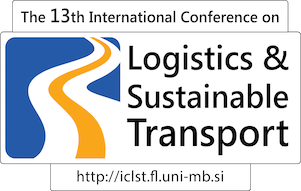Key dates/Milestones
Please remember the following dates / milestones
| December 2015 | Call for Abstracts opens |
| 14 February 2016 | Deadline for full Abstracts |
| 27 February 2016 | Notification of accepted Abstracts & Conference Registration opens |
| 1 March 2016 | Call for Papers opens |
| 27 April 2016 | Deadline for Early Registration |
| 1 May 2016 | Deadline for full Papers |
| 14 May 2016 | Notification of accepted Papers |
| 27 May 2016 | Deadline for Presentations |
Abstract/paper submission
Those interested in presenting a paper at the conference are invited to submit an abstract in English of 300-400 words and send it via the Online subimission System
News
-
Abstracts
The Programme of the ICLST 2016 ICLST PROGRAMME 2016 Thursday, 16 June 2016 | Friday, 17 June 2016 Thursday,... read more.
-
The ICLST on the list of “Top 10 Logistics events in 2013”
The International Conference on Logistics & Sustainable Transport was selected for the list of “Top 10 Logistics events in 2013”... read more.
About the Conference
Topics of this year's conference include, but are not limited to the use of common infrastructure, economies of integrated information systems, definitions and applications of Internet of Things, safety, economy of scope in vehicle use, fuel efficiency, and other similar topics.
The International Conference on Logistics and Sustainable Transport (ICLST) is a premier event in sustainable logistics and transport in the region. The conference is geared towards professionals, academics from all disciplines, public policy makers, researchers and students who are involved in logistics and supply chain management, traffic management and transportation of people and freight.
Sustainable logistics is interdisciplinary, and as such needs to be researched, developed, integrated, and implemented into the entire supply chain. This entails constant upgrading in education and applicative knowledge. This conference gathers expertise from industry, academia and government to candidly exchange ideas, share latest research developments and experiences.
Read more...
























